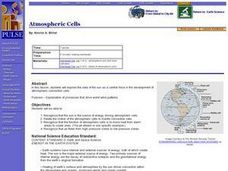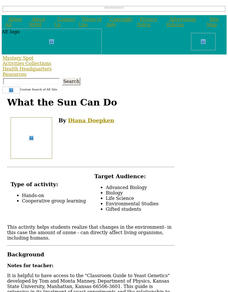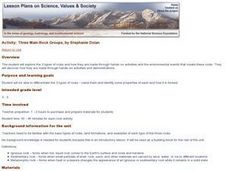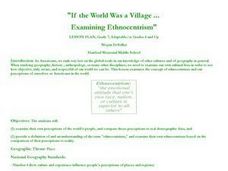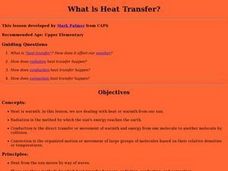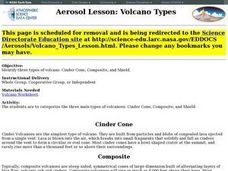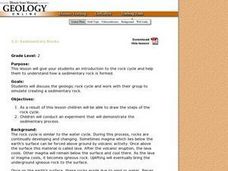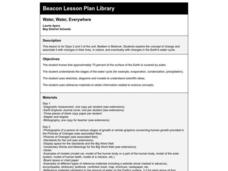Curated OER
Earthquake Epicenters and Magnitudes
Students work on a virtual earthquake to increase their understanding of seismograms, earthquake epicenters, Richter Magnitude and triangulation when finding the epicenter of an earthquake.
Alabama Learning Exchange
Our World is Like a Rainbow
Students create a Venn diagram of people's similarities and differences. They investigate why people relocate to different geographic regions after investigating the positives and negatives of different states.
Curated OER
Atmospheric Cells
Students recognize that the sun is the source of energy driving atmosphere cells. They relate the motion of the atmospheric cells to mantle convection cells. Students recognize that the function of atmospheric cells is to move heat from...
Curated OER
And the Rains Came Down: A South American Rainforest
Students examine the characteristics of a South American tropical rainforest. They analyze maps, develop graphs, listen to the book, The Great Kapok Tree, and create a rainforest mural.
Curated OER
Weather Predictions
Students record weather data and create a five day forecast. Students investigate the roles of meteorologists and identify symbols used on a weather map. After gathering weather data for a week, students will create a five day forecast...
Curated OER
Volcano!-Thar She Blows!
Learners describe how volcanoes are formed. They name the types of boundaries where volcanoes occur. They utilize models to illustrate the occurence of volcanoes and earthquakes along plate boundaries. They compare and constrast the...
Curated OER
Factors affecting infiltration and runoff
Students investigate some of the factors that determine the amount of runoff. They are reminded that infiltration and runoff tend to work oppositely. When conditions are bad for infiltration they usually lead to runoff.
Curated OER
What the Sun Can Do
Students develop and test a unique, personally-relevant hypothesis about the consequences of exposure to UV radiation based units on a living organism, common baker's yeast (Saccharomyces cerevisiae).
Curated OER
Bhutan, the Last Shangri-La: Sandwich Squash: How the Himalayas Were Formed
Young scholars create and record a model of mountain formation. They identify major mountain building formations. Students understand how the Himalaya Mountains were formed, why they are located near Bhutan, and why they are becoming...
Curated OER
Three Main Rock Groups
Students are introduced to igneous, sedimentary and metamorphic rocks. They use foods to demonstrate the basic formation of each type of rock, read books about rock formation and view related videos.
Curated OER
A River Ecosystem
Pupils examine the components of a river ecosystem. They discuss the picture and text from the book, "A River Ran Wild," and create a mobile of a river ecosystem using magazine pictures or original drawings.
Curated OER
Bird's Eye View Map
Young scholars explore seeing things from a bird's eye view. They listen to the book, "As the Crow Flies," view various objects from eye level views and standing on a chair, create a drawing of an object from both views, and read "Ben's...
Curated OER
If the World Was a Village...Examining Ethnocentrism
Seventh graders examine their own perceptions of world's people, compare those perceptions to real demographic data, provide definition and understanding of term "ethnocentrism," and examine their own ethnocentrism based on comparison of...
Curated OER
Science of War
Tenth graders, from an environmental perspective, study the pros and cons of war. Distinctions between characteristics of biological, chemical and nuclear threats and the impact of economic development are considered.
Curated OER
Aerosol Lesson: Volcano Types
Students identify three types of volcano: cinder cone, composite, and shield.
Curated OER
2.2: Sedimentary Rocks
Second graders discuss the geologic rock cycle and work with their group to simulate creating a sedimentary rock. They conduct an experiment that demonstrates the sedimentary process and draw the steps of the rock cycle.
Curated OER
Harvest the Wind
Wind is a natural resource available around the world. Help your pupils appreciate the power and importance of wind by researching wind farms, making pinwheels, and designing windmills.
Curated OER
Mining Simulation
Eighth graders put their knowledge of rocks and minerals into perspective by seeing how minerals can be mined and the difficulties and costs of mining. They explore the environmental impacts of mining.
Curated OER
Global Resources: What Will You Do with Your Power?
Students examine the human impact on natural resources. They read and discuss an article, evaluate nations regarding their environmental problem-solving, develop a presidential speech on the environment, and conduct a natural resources...
Curated OER
Evaporation
Fourth graders study the water cycle and the different processes involved, specifically evaporation. They explore the processes of evaporation through hands-on collaborative activities and relate learning to life through...
Curated OER
The Coldest Place at the Bottom of the World
Young scholars examine Ernest Shackleton's journey through the Antarctic and trace Shackleton's Actual Route on a map using longitude and latitude coordinates. Students compare his intended route with his actual and determine how far...
Curated OER
Dimming the Sun
Pupils collect, interpret and analyze weather variable data. They describe atmospheric variables that affect evaporation. Students create graphs and analyze the information collected.


